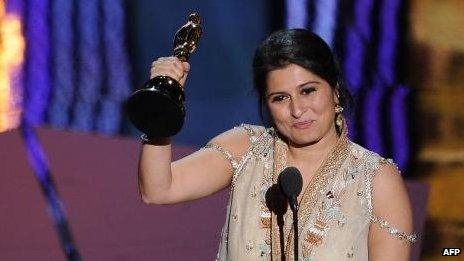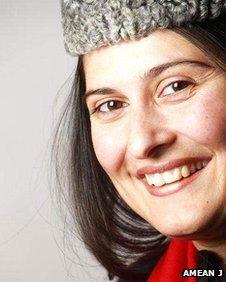Pakistan's Oscar triumph for acid attack film Saving Face
- Published

Sharmeen Obaid-Chinoy's Oscar win marked a historic cinematic triumph for Pakistan
Film-maker Sharmeen Obaid-Chinoy's triumph in becoming the first Pakistani to win an Oscar has been greeted with jubilation in her home country.
Tributes on TV and social media have been pouring in, with local channels repeatedly showing footage of her receiving the award on Monday.
She won the award for best documentary in the short subject category for her film Saving Face, about acid attacks on women. The film chronicles the work of acclaimed British-Pakistani plastic surgeon Mohammad Jawad.
It follows him as he travels around the country to perform reconstructive surgery on survivors of acid violence and is told by survivors going through the recovery and reconciliation process.
Ms Obaid-Chinoy's dedication at the Oscar ceremony was pointed: "For all the women in Pakistan working for change, don't give up on your dreams - this is for you."
Although the film and its international acclaim has served to bring to the fore this brutal aspect to Pakistani society, activists say there is still a long way to go before the situation on the ground truly changes.
One of the acid attack victims featured in the documentary did not want to speak on the record as she still lives with the husband who carried out the crime. She says that it is necessary to do so for the sake of the children.
'Horribly disfigured'
The observational documentary was filmed entirely in Pakistan, primarily in the centre of the country and in the cities of Rawalpindi, Karachi and Islamabad.
The practice of acid attacks in Pakistan leaves victims - who are mostly women - horribly disfigured in the face.
Although thousands are affected by acid attacks, in a country where women are often the victims of numerous crimes, the problem has often been under-reported.
But in 2011 legislation was introduced to address the problem. The Acid Control and Acid Crime Prevention Bill stipulates that attackers can be jailed from 14 years to life, in addition to receiving a 1m rupees fine (£7,000; $12,000).
But life for many victims also amounts to a form of imprisonment.

Ms Obaid-Chinoy said she wanted to win an Oscar to make Pakistan proud
Another acid attack victim - who still has not been compensated for the attack against her - says that she is thrilled over Ms Obaid-Chinoy's win.
"We've been watching TV all morning," she said, "and I don't have the words to thank Ms Obaid-Chinoy for what she's done.
"I think it will become easier for women now and it will scare the perpetrators."
Meanwhile Prime Minister Yousuf Raza Gilani has announced the highest civil award for Ms Obaid-Chinoy. Such moves have been warmly welcomed by her admirers.
"When the bill was passed Sharmeen was there to film it. It was a huge deal for women," said politician Marvi Memon who featured in the film.
"The law is already in place but Sindh [province] has been defaulting - so people may wake up now because of this documentary. I think this issue has come to the forefront.
"We are extremely proud of Sharmeen - she is hardworking, capable and it is an honour for Pakistan that we have won an Oscar through her.
"She won and she embodies a beautiful woman of Pakistan - she is beautiful inside and out."
Other supporters are equally full of praise.
"This documentary shows we are not powerless - Pakistani women... are not victims anymore, but agents of change," proclaims Valarie Khan, Chairperson of Acid Survivors Foundation who helped Ms Chinoy make the documentary.
"There are 200 attacks a year," she says, with reports [of such incidents] increasing.
"We have treated 150 patients - it is a long-term treatment [programme] but there is much more work [still] to do.
"We need to focus on [the police] investigation, the trial [process] and rehabilitation and we hope this documentary adds pressure not to stop here."
When she was nominated for the award in January Ms Obaid-Chinoy said it was the "stuff dreams are made of".
Now that dream has been fulfilled.
- Published29 February 2012